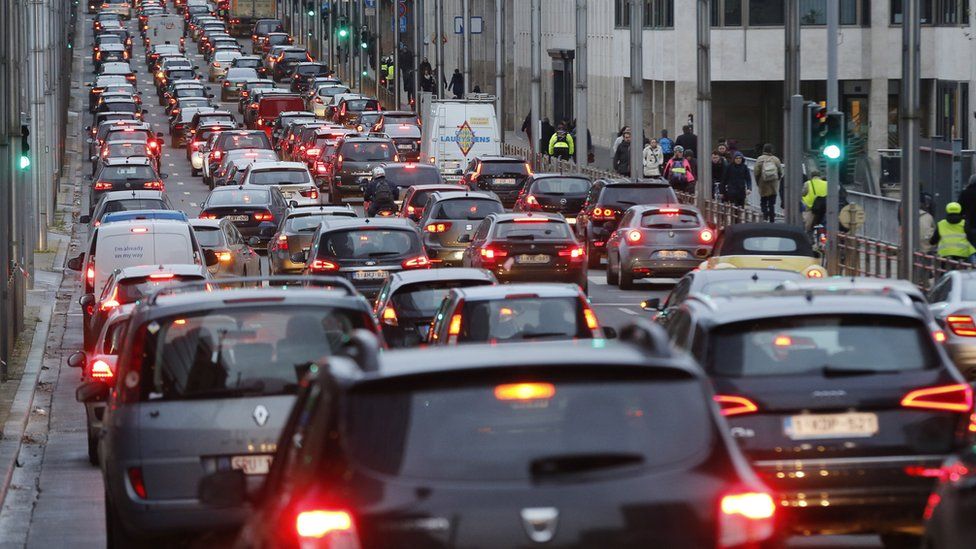A difficult week in Brussels
- Published

One sure sign that Brussels is beginning to get back to business: the traffic's a mess again.
"Overturned lorry," said a colleague, ruefully. "It was a three-hour commute."
Hardly a sign that people are staying at home.
But the snarl-ups aren't just happening on the roads.
Mixed messages, understandable jitters, sniping from abroad and comments in the international media that Belgium has become "the world's most prosperous failed state" have made this a difficult week.
Schools have reopened in Brussels, as have parts of the Metro.
Now the alert level in the city has been reduced from four (the highest possible) to three (serious), but there are no obvious hints that the most wanted suspects are about to be caught.
It's hardly surprising that this mood of uncertainty is reflected among commuters making their way home.
'Uneven response'
"They are reopening things," said Ines, "but what evidence is there that anything has changed?
"That's why I'm not so sure I'm confident - the response is a little uneven."
Cecile, who works in the nearby immigration office, has a slightly different take.
"I don't feel insecure myself - if terrorists want to attack they won't do it right now, there are too many troops about.
"But we'll have to be very careful in the next few weeks and months."
Everyone is hoping that this is not the new normal, with armed police outside the school gates and soldiers in combat fatigues patrolling through shopping centres and railway stations.
But, inevitably, there has been a psychological effect. And the economic impact has already been felt in shops and businesses that rely on the weeks leading up to Christmas for a huge chunk of their profits.
"It's a bit of a disaster," said Dmitri, compulsively rearranging a row of jackets hanging on display in an upmarket boutique on one of the city's main thoroughfares.
"How many customers have you had in today?"
"You're the first," he said.
Rising discontent
The surrounding streets are no longer empty, but they are hardly bustling with activity either.
"I'm still scared to go on the Metro," said Sally, as she scurried past on her way to work. "I hope nothing happens in Brussels."
The government says there is still a threat and it must be taken extremely seriously, but discontent with the way the situation has been handled is growing.
Safety first, yes. And some intelligence obviously has to stay secret.
But the way information has often leaked out in dribs and drabs has added weight to accusations that Belgium's multi-layered political system is dysfunctional.
The Interior Minister, Jan Jambon - a Flemish nationalist who doesn't really believe the country should exist in its current form - has said there were indications that there would be terrorist attacks in Brussels last Sunday evening.
But judicial sources told public television that a series of police raids on Sunday were not intended to prevent an attack but "to give the hornets' nest a good kick".
Confusion - and defiance
Most of the people detained during police searches since the Paris attacks have been released, and few weapons or explosives have been recovered.
Another minister - the Foreign Minister, Didier Reynders - said the authorities were looking for "maybe 10 or more people in Belgium, maybe in neighbouring countries, present in the territory to organise some terrorist attacks".
That would certainly tally with the suspicion that a second jihadi cell might be planning multiple and simultaneous attacks along the lines of what happened in Paris.
But it is unclear whether the security forces have any idea about who these suspects might be. Only two wanted men - Salah Abdeslam and Mohamed Abrini - have been publicly identified.
It all adds to a sense of confusion. Perhaps that is inevitable.
Even the reduction in the threat level from four to three will not inspire confidence in everyone. At the beginning of the week, Prime Minister Charles Michel said that Brussels would remain at level four until next Monday at least.
So there are many people still feeling a little nervous, in a city that is more accustomed to bureaucratic bungling than the threat of terrorism.
On the other hand, plenty of others are refusing to be intimidated.
"No, I'm not scared," said Julie, a student emerging from the Louise Metro station. "We shouldn't be scared. If we're scared, they win."
"You can never predict anything," added Rosario, a visiting tourist from the United States, "you can be in danger in front of your own house.
"So just get on with life. It can happen anywhere, but I feel fine."
The lockdown in Brussels
- Schools were closed on Monday and Tuesday. Some 300 police helped step up security when they reopened on Wednesday
- The Metro underground transport system and some bus routes were suspended. An extra 200 police were allocated to patrol the metro when it reopened on Wednesday
- Many shops, bars and cinemas were shut
- It was up to employers whether to keep their workplaces open - some told staff to stay at home